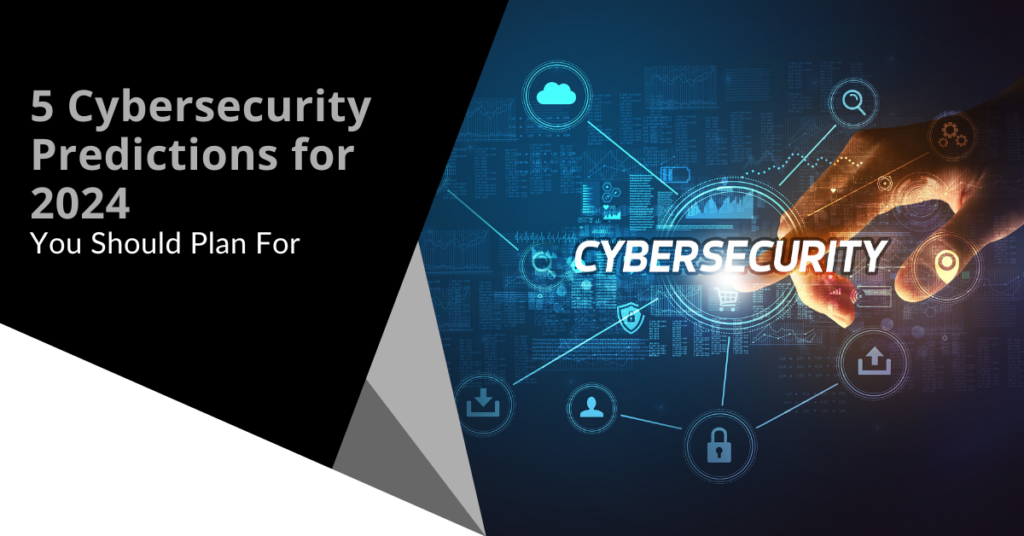Beware of the rise of Deepfake Social Engineering Attacks tricking users.
Beware of the rise of Deepfake Social Engineering Attacks tricking users.
Blog Article
The Following Frontier: Insightful Cybersecurity Predictions for the Coming Year
As we come close to the new year, the cybersecurity landscape is on the edge of notable transformation. Key elements such as the assimilation of innovative AI innovations, the unpreventable rise of innovative ransomware, and the tightening of information privacy policies are forming the future of digital security. Furthermore, the recurring frequency of remote work remains to reveal new vulnerabilities that organizations must browse. Understanding these dynamics is important for expecting the obstacles ahead and strategically strengthening defenses, yet the effects of these changes stay to be completely checked out.
Increase of AI in Cybersecurity
In the rapidly evolving landscape of cybersecurity, the combination of expert system (AI) is becoming an essential force in enhancing danger detection and reaction capacities. AI innovations, such as device understanding formulas and deep learning models, are being significantly released to assess huge quantities of information and identify patterns indicative of safety and security dangers. Deepfake Social Engineering Attacks. This makes it possible for companies to proactively resolve susceptabilities before they can be made use of
The rise of AI in cybersecurity is specifically substantial in its ability to automate regular tasks, permitting human experts to concentrate on even more intricate safety and security concerns. By leveraging AI, cybersecurity groups can decrease reaction times and enhance the precision of risk assessments. AI systems can adapt and discover from new risks, continuously improving their discovery mechanisms to stay ahead of destructive actors.
As cyber dangers become a lot more sophisticated, the requirement for advanced solutions will certainly drive further financial investment in AI modern technologies. This fad will likely lead to the advancement of improved safety and security tools that integrate predictive analytics and real-time monitoring, eventually strengthening organizational defenses. The change towards AI-powered cybersecurity services represents not just a technical shift but an essential change in just how companies approach their protection strategies.
Boost in Ransomware Strikes
Ransomware assaults have actually become a common threat in the cybersecurity landscape, targeting companies of all dimensions and throughout numerous sectors. As we progress right into the coming year, it is anticipated that these strikes will not just increase in regularity but likewise in sophistication. Cybercriminals are leveraging advanced tactics, consisting of making use of expert system and maker learning, to bypass conventional security steps and manipulate susceptabilities within systems.
The acceleration of ransomware strikes can be attributed to a number of elements, including the rise of remote work and the expanding dependence on electronic solutions. Organizations are frequently not really prepared for the developing risk landscape, leaving important facilities vulnerable to breaches. The economic ramifications of ransomware are incredible, with firms dealing with hefty ransom money demands and possible long-term functional disturbances.
In addition, the pattern of double extortion-- where enemies not just secure information however additionally intimidate to leak sensitive details-- has obtained grip, even more coercing sufferers to adhere to demands. As a result, companies should focus on durable cybersecurity procedures, including normal back-ups, staff member training, and occurrence reaction planning, to mitigate the risks associated with ransomware. Failing to do so can cause ruining consequences in the year in advance.
Advancement of Information Privacy Regulations
The landscape of information personal privacy guidelines is undergoing considerable transformation as federal governments and organizations react to the increasing issues bordering personal data security. In recent years, the implementation of comprehensive frameworks, such as the General Data Protection Policy (GDPR) in Europe and the California Consumer Personal Privacy Act (CCPA) in the USA, has actually established a precedent for stricter personal privacy laws. These guidelines emphasize consumers' civil liberties to manage their information, mandating openness and responsibility from companies that accumulate and refine individual details.

Moreover, organizations cyber resilience will certainly need to boost their compliance techniques, spending in innovative technologies and training to safeguard sensitive info. The advancement of information privacy laws will not just effect exactly how services operate however likewise shape customer assumptions, promoting a culture of depend on and safety in the digital landscape.
Growth of Remote Work Susceptabilities
As companies continue to embrace remote job, vulnerabilities in cybersecurity have significantly involved the forefront. The shift to versatile work plans has revealed vital spaces in security methods, especially as workers gain access to delicate data from different locations and gadgets. This decentralized work environment produces a broadened attack surface for cybercriminals, who exploit unprotected Wi-Fi networks and individual gadgets to penetrate company systems.

To minimize these susceptabilities, companies have to prioritize extensive cybersecurity training and carry out robust security structures that incorporate remote job situations. This includes multi-factor verification, routine system updates, and the establishment of clear protocols for information access and sharing. By resolving these susceptabilities head-on, companies can promote a much safer remote workplace while preserving functional durability despite evolving cyber hazards.
Advancements in Danger Discovery Technologies


Proactive danger discovery has become a keystone of modern cybersecurity techniques, showing the urgent requirement to counteract increasingly innovative cyber dangers. As companies deal with an evolving landscape of susceptabilities, developments in danger detection modern technologies are crucial in mitigating risks and improving safety and security postures.
One remarkable trend is the assimilation of synthetic intelligence and artificial intelligence right into risk discovery systems. These technologies enable the analysis of vast amounts of data in actual time, enabling for the identification of abnormalities and potentially malicious tasks that may avert typical security procedures. In addition, behavior analytics are being carried out to develop baselines for normal user activity, making it easier to discover deviations indicative of a breach.
Additionally, the rise of automated risk knowledge sharing platforms promotes joint protection efforts across sectors. This real-time exchange of details enhances situational awareness and speeds up response times to arising threats.
As companies remain to spend in these sophisticated innovations, the effectiveness of cyber protection mechanisms will dramatically improve, equipping protection teams to remain one action ahead of cybercriminals. Inevitably, these developments will certainly play an important duty in shaping the future landscape of cybersecurity.
Verdict
In summary, the future year is anticipated to witness transformative developments in cybersecurity, driven by the integration of AI technologies and a notable boost in ransomware strikes. As data personal privacy policies end up being a lot more rigorous, companies will certainly need to boost conformity approaches. The continuous challenges postured by remote work vulnerabilities require the implementation of robust security steps and comprehensive training. In general, these progressing dynamics highlight the important importance of adapting to an ever-changing cybersecurity landscape.
Report this page